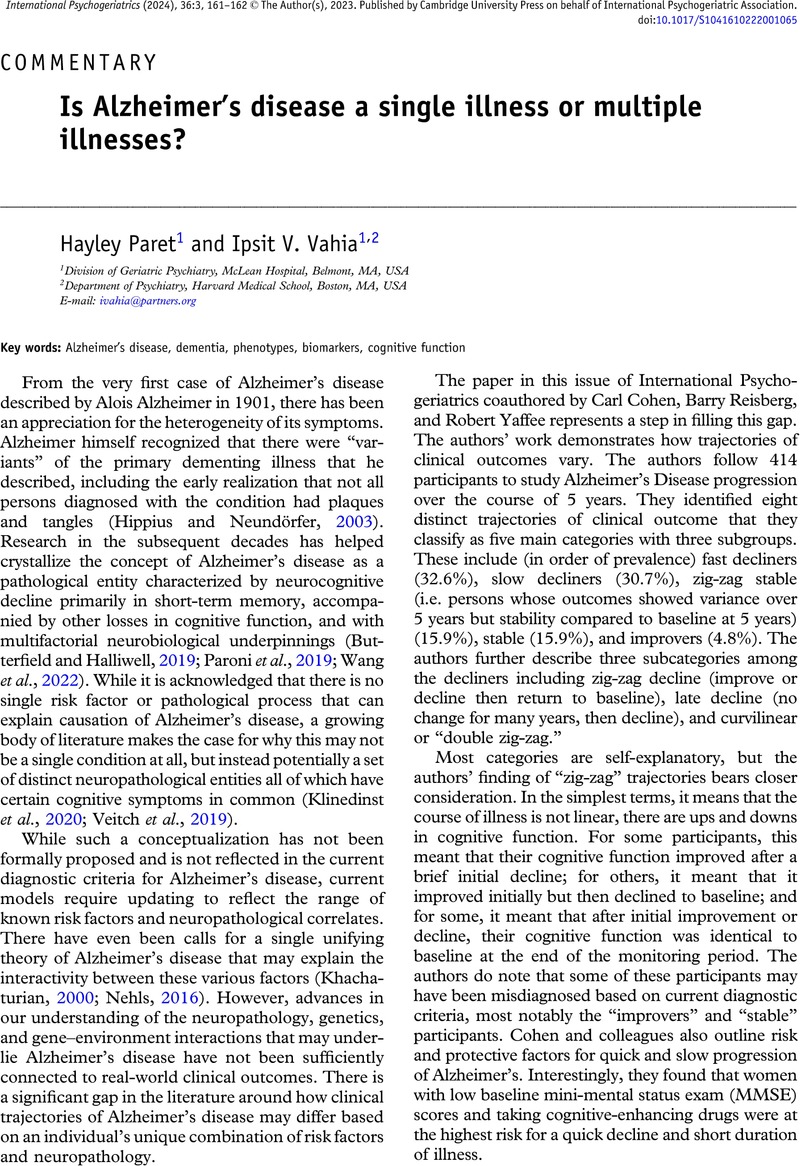No CrossRef data available.
Article contents
Is Alzheimer’s disease a single illness or multiple illnesses?
Published online by Cambridge University Press: 03 January 2023
Abstract
An abstract is not available for this content so a preview has been provided. Please use the Get access link above for information on how to access this content.

- Type
- Commentary
- Information
- Copyright
- © The Author(s), 2023. Published by Cambridge University Press on behalf of International Psychogeriatric Association
References
Au-Yeung, W. M. et al. (2022). Monitoring behaviors of patients with late-stage dementia using passive environmental sensing approaches: a case series. The American Journal of Geriatric Psychiatry: Official Journal of the American Association for Geriatric Psychiatry, 30, 1–11. DOI https://doi.org/10.1016/j.jagp.2021.04.008.CrossRefGoogle ScholarPubMed
Butterfield, D. A. and Halliwell, B. (2019). Oxidative stress, dysfunctional glucose metabolism and Alzheimer disease. Nature Reviews. Neuroscience, 20, 148–160. DOI https://doi.org/10.1038/s41583-019-0132-6.CrossRefGoogle ScholarPubMed
Germine, L., Strong, R. W., Singh, S. and Sliwinski, M. J. (2021). Toward dynamic phenotypes and the scalable measurement of human behavior. Neuropsychopharmacology: Official Publication of the American College of Neuropsychopharmacology, 46, 209–216. DOI https://doi.org/10.1038/s41386-020-0757-1.CrossRefGoogle ScholarPubMed
Hippius, H. and Neundörfer, G. (2003). The discovery of Alzheimer’s disease. Dialogues in Clinical Neuroscience, 5, 101–108. DOI https://doi.org/10.31887/DCNS.2003.5.1/hhippius.CrossRefGoogle ScholarPubMed
Khachaturian, Z. S. (2000). Toward a comprehensive theory of Alzheimer’s disease -- challenges, caveats, and parameters. Annals of the New York Academy of Sciences, 924, 184–193. DOI https://doi.org/10.1111/j.1749-6632.2000.tb05577.x.CrossRefGoogle Scholar
Klinedinst, B. S. et al. (2020). Genetic factors of Alzheimer’s disease modulate how diet is associated with long-term cognitive trajectories: a UK Biobank study. Journal of Alzheimer’s Disease, 78, 1245–1257.CrossRefGoogle ScholarPubMed
Nehls, M. (2016). Unified theory of Alzheimer’s disease (UTAD): implications for prevention and curative therapy. Journal of Molecular Psychiatry, 4. https://doi.org/10.1186/s40303-016-0018-8.CrossRefGoogle ScholarPubMed
Paroni, G., Bisceglia, P. and Seripa, D. (2019). Understanding the amyloid hypothesis in Alzheimer’s disease. Journal of Alzheimer’s Disease: JAD, 68, 493–510. DOI https://doi.org/10.3233/JAD-180802.CrossRefGoogle ScholarPubMed
Veitch, D. P. et al. (2019). Understanding disease progression and improving Alzheimer’s disease clinical trials: recent highlights from the Alzheimer’s disease neuroimaging initiative. Alzheimer’s & Dementia: the Journal of the Alzheimer’s Association, 15, 106–152. DOI https://doi.org/10.1016/j.jalz.2018.08.005.CrossRefGoogle ScholarPubMed
Wang, I. F., Ho, P. C. and Tsai, K. J. (2022). MicroRNAs in learning and memory and their impact on Alzheimer’s disease. Biomedicines, 10, 1856. DOI https://doi.org/10.3390/biomedicines10081856.CrossRefGoogle ScholarPubMed




